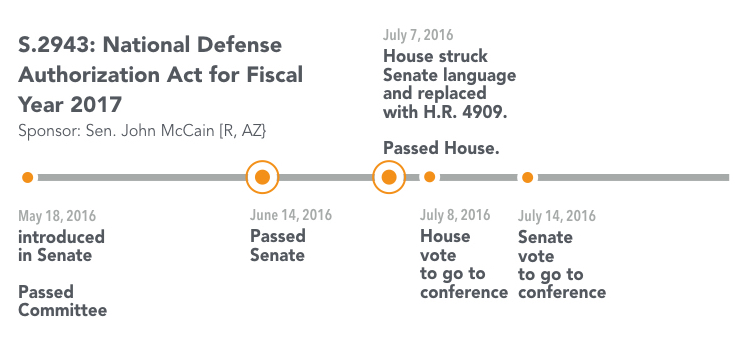Congress is "going to conference" on the on annual defense authorization bill:
That means House Democrats and Republicans will appoint a few members as "conferees"; Senate Democrats and Republicans will do the same. The conferees will meet to hammer out differences between what passed the House and what passed the Senate, to reach one combined version that will go back to both chambers for a vote. According to U.S. Constitution, chambers must pass identical legislation for bill to become law.
President Obama has threatened to veto both the House and Senate versions.

The Senate Version:
National Defense Authorization Act for Fiscal Year 2017 (S. 2943)
Sponsor: Sen. John McCain [R, AZ]
Provisions include:
- $602 billion in base funding for Military Services
- Large-scale procurement and contracting overhaul.
- 25% reduction in general and flag officers and DOD Senior Executive Service civilian employees
- Reforms to the military health system
- Implementing the recommendations of the Department of Defense Military Justice Review Group
Read a summary of the bill here.
One of S.2943’s most controversial amendments was Sec. 591, which would require that women turning 18 on or after January 1, 2018 would be obligated to register for Selective Service in the same way men register now.
The consequences for not registering would be the same men currently face, such as the possible loss of financial aid like Pell grants. However, this provision would not apply to women who turned 18 before January 2018. The amendment received support from military leaders and Republicans and Democrats alike in the Senate, but some more conservative members opposed it.
The House Version:
National Defense Authorization Act for Fiscal Year 2017 (H.R. 4909)
Sponsor: Rep. Mac Thornberry [R, TX-13]
The $610 billion House NDAA would use $18 billion meant for war funding to cover the Pentagon’s base budget, a measure not included in the Senate version and likely difficult to reconcile during conference negotiations.
Other policy provisions include:
-
Upholding the 2001 Authorization for the Use of Military Force
-
Delivering, modernizing, and maintaining new equipment
-
Reforms to the Military Health System
-
Making the Joint Staff and operations more accountable and transparent
One of bill's more controversial provisions was an amendment preventing discrimination against LGBT employees by federal contractors. In May, chaos erupted on the House floor when several Republicans switched their vote on the amendment at the last minute, causing the amendment to fail.
Conferees will begin their work on a combined bill after they return from recess in September.
Please keep in mind that highlighting a bill does not imply POPVOX endorsement in any way. As always, our goal is to offer one more way to help you stay informed about the complex U.S. legislative system.